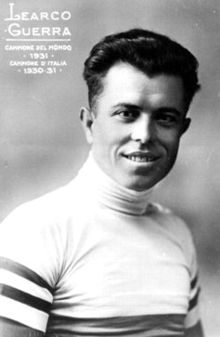 | |||||||||||||||||||||
| Personal information | |||||||||||||||||||||
|---|---|---|---|---|---|---|---|---|---|---|---|---|---|---|---|---|---|---|---|---|---|
| Full name | Learco Guerra | ||||||||||||||||||||
| Nickname | Human Locomotive | ||||||||||||||||||||
| Born | 14 October 1902 Bagnolo San Vito, Italy | ||||||||||||||||||||
| Died | 7 February 1963 (aged 60) Milan, Italy | ||||||||||||||||||||
| Team information | |||||||||||||||||||||
| Discipline | Road | ||||||||||||||||||||
| Role | Rider | ||||||||||||||||||||
| Professional teams | |||||||||||||||||||||
| 1928–1935 | Maino–Dunlop | ||||||||||||||||||||
| 1936–1939 | Legnano–Wolsit | ||||||||||||||||||||
| 1940 | Dei/Legnano | ||||||||||||||||||||
| 1941–1944 | Dei | ||||||||||||||||||||
| Major wins | |||||||||||||||||||||
Grand Tours
| |||||||||||||||||||||
Medal record
| |||||||||||||||||||||
Learco Guerra (14 October 1902 – 7 February 1963) was an Italian professional road racing cyclist. The highlight of his career was his overall win in the 1934 Giro d'Italia. He was born in San Nicolò Po, a frazione of Bagnolo San Vito in Lombardy, gained the nickname of "Human Locomotive" for his enduring quality in plain stages. After mediocre attempts to play football, Guerra became a professional cyclist in 1928, at 26. The following year he became Italian champion, racing as an independent or semi-professional.
In 1930 he won his first Italian National Road Race Championships, the first of five straight wins. That same year he came second in the Tour de France after Italy's leader, Alfredo Binda, proved in poor form. The race was won by the Frenchman, André Leducq. In 1931 Guerra won four stages of the Giro d'Italia but not the final victory. In this Giro, he was the first rider who wore the pink jersey. The same year he won the world cycling championship.
In 1933 Guerra was again second in the Tour de France, and he won the Milan–San Remo. In 1934 came his greatest success, 10 stages of the Giro d'Italia and the general classification. He was also second in the world championship.
Guerra set a record of victories in a single year that was beaten only in the 1970s. His fame was exploited by the Fascist government, which profited from his heroic status.
After retirement, he worked as a team manager for riders such as Hugo Koblet and Charly Gaul.
Affected by Parkinson's disease, he died in Milan in 1963.